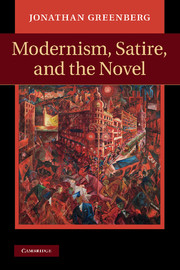Book contents
- Frontmatter
- Contents
- Illustration
- Preface
- Abbreviations
- Chapter 1 Satire and its discontents
- Chapter 2 Modernism's story of feeling
- Chapter 3 The rule of outrage: Evelyn Waugh's Vile Bodies
- Chapter 4 Laughter and fear in A Handful of Dust
- Chapter 5 Cold Comfort Farm and mental life
- Chapter 6 Nathanael West and the mystery of feeling
- Chapter 7 Nightwood and the ends of satire
- Chapter 8 Beckett's authoritarian personalities
- Notes
- Index
Chapter 7 - Nightwood and the ends of satire
Published online by Cambridge University Press: 07 October 2011
- Frontmatter
- Contents
- Illustration
- Preface
- Abbreviations
- Chapter 1 Satire and its discontents
- Chapter 2 Modernism's story of feeling
- Chapter 3 The rule of outrage: Evelyn Waugh's Vile Bodies
- Chapter 4 Laughter and fear in A Handful of Dust
- Chapter 5 Cold Comfort Farm and mental life
- Chapter 6 Nathanael West and the mystery of feeling
- Chapter 7 Nightwood and the ends of satire
- Chapter 8 Beckett's authoritarian personalities
- Notes
- Index
Summary
One contention of this book has been that far from being simply anti-modern, satire occurs at the scene of modernity, that satire is dependent upon and symptomatic of the modern. For modernity implies not only newness but also a degenerate culture against which the modern orients itself. Matei Calinescu has described this dynamic in his analysis of progress and decadence, terms which, he argues, “imply each other so intimately that, if we were to generalize, we would reach the paradoxical conclusion that progress is decadence and conversely, decadence is progress.” For Michael Seidel, similarly, satire at once marks the disruptive emergence of novelty and the senescent decline of tradition. Its irony is both a symptom and a cause of the weakening of literary inheritance: “In satiric narration, irony is . . . a negation of that phase of narrative that counts on making such things as saga, legend, myth, fable, and determinative allegory seem legitimate or authoritative . . . Irony must come at the end of inheritable literary transmissions, so that irony is a step in the direction of revision.” Seidel extends this claim about literary forms to the thematics of satire; because of satire's concern with its own legitimacy, its anxieties about literary continuities find representation in figures of failed familial and biological inheritance. Seidel concludes: “Satire's actions depict the falling-off or exhaustion of a line . . . The origin of satiric being is the absurd or suspect birth.”
In reading Djuna Barnes's Nightwood as satire, I therefore foreground its themes of cultural tradition, familial inheritance, and sexual generativity. In the novel, these phenomena are represented negatively: tradition is on the wane, inheritance is in jeopardy, sexual reproduction is in crisis, and all are represented through what I call anti-procreative imagery – sterility, impotence, infanticide, abortion. Thus, although Barnes, unlike Waugh, Gibbons, or West, is not generally described as a satirist, Nightwood's strategies of stymieing inheritance manifest the miscarriage of generational continuity which Seidel recognizes as central to the mode.
- Type
- Chapter
- Information
- Modernism, Satire and the Novel , pp. 138 - 160Publisher: Cambridge University PressPrint publication year: 2011



